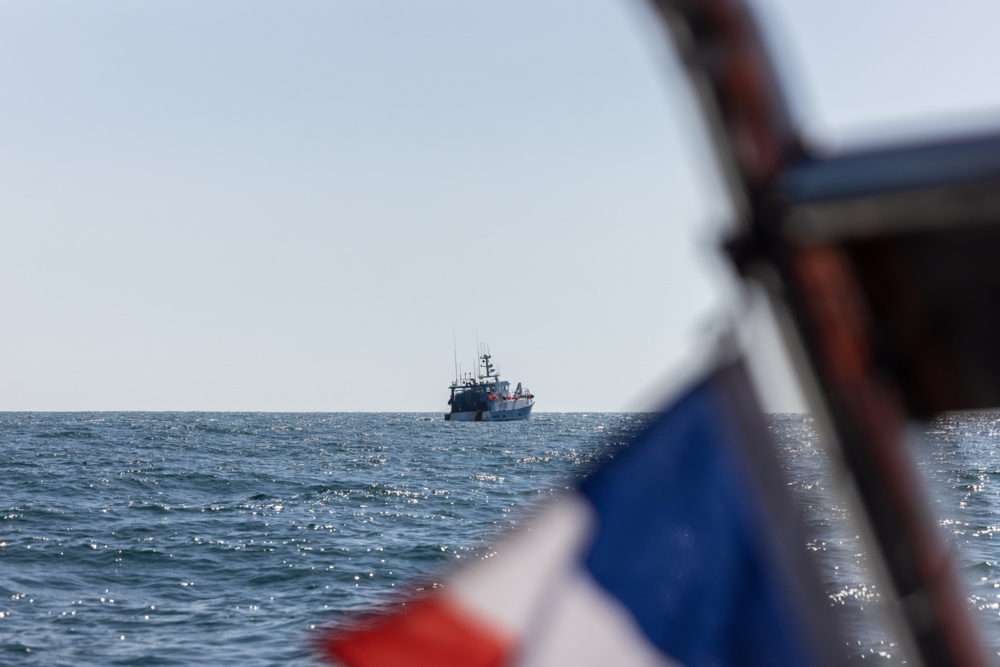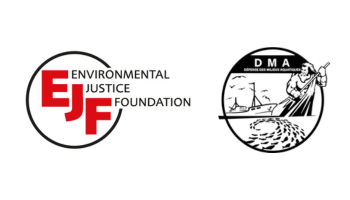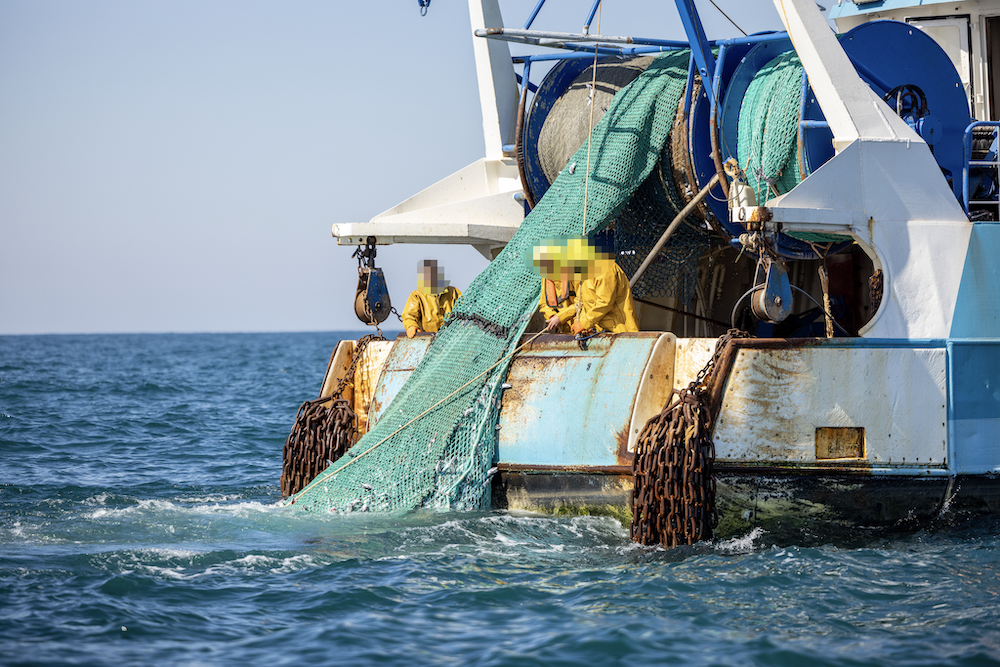
Press release: NGOs take the French government to court to stop destructive fishing in marine protected areas

Today, the Environmental Justice Foundation (EJF) and Défense des Milieux Aquatiques (DMA) have launched legal action against France for not prohibiting bottom trawling in Natura 2000 Marine Protected Areas (MPAs). The two NGOs are taking their case to the country's highest court, the Conseil d'Etat, concerning the Chausey MPA, and to the Tribunal Administratif de Rouen for the Bancs des Flandres MPA, over France's failure to comply with its obligation to protect the marine environment from damage caused by bottom trawling, which they say violates national and EU law.
Bottom trawling, a fishing method that involves dragging weighted nets across the seabed, is a leading cause of habitat destruction in MPAs. It inflicts lasting damage on seabed ecosystems. Yet, in France this destructive practice is still carried out in 77% of marine Natura 2000 sites*, in violation of national and EU environmental law. Over the last five years, approximately 200,000 hours of trawling were recorded every year in French MPAs, when there should be none.
Focusing on two MPAs, the request highlights a wider failure by the French government to enforce protections across French waters. Despite their critical role in climate regulation, biodiversity conservation, and sustainable fisheries, MPAs are being severely harmed due to weak enforcement of rules and a lack of effective management measures. With the UN Ocean Conference in Nice approaching, the two NGOs, along with the Protect Our Catch campaign coordinated by Only One, urge France to show leadership in marine conservation.
"We are initiating this legal action because, even though the Natura 2000 network covers 35% of France's maritime territory, 90% of the species and habitats it protects remain under threat, making these MPAs nothing more than lines on a map”, said Marie Colombier, Senior Ocean Campaigner at EJF. “It’s high time the responsible authorities in France act to protect France's invaluable marine biodiversity hotspots. How else can France lead global action for our blue planet and credibly host the upcoming UN Ocean Conference in Nice?”
“Bottom trawling is at odds with biodiversity conservation and France’s legal commitments to protecting MPAs, said Raphaelle Jeannel, senior lawyer at Huglo Lepage Avocats. “Today the preservation of marine biodiversity is a matter of law and the State must ensure it is effectively enforced.”
"Proper enforcement of existing regulations in MPAs could revitalise small-scale coastal fishing, a low-impact and sustainable practice, and boost local economies”, said Philippe Garcia, President of DMA. “Yet, current policies prioritise short-term profits and overexploitation, leaving ecosystems degraded and fishermen without a clear path forward. Sustainable fisheries depend on healthy marine ecosystems, and without effective action, the sector's future remains at risk."
“I support this legal action”, said Mathilde Ollivier, French Senator. “In the run-up to the United Nations Conference on the Oceans, the government must put its money where its mouth is and finally ensure real protection for marine protected areas. For the time being, France is failing to live up to its ambitions for the conservation of marine ecosystems.”
*77% of predominantly or entirely marine Special Areas of Conservation (see notes to editors).
ENDS
Notes to editors
The Natura 2000 network of protected areas is designed to safeguard vulnerable habitats and species in the EU. EU law requires Member States to take action to maintain and restore protected habitats and species at a favourable conservation status within Natura 2000 Special Areas of Conservation (SAC). This includes obligations for Member States to prevent environmental damage, and to assess risks posed by human activities before authorising them within the sites.
Bancs des Flandres and Chausey, located in the English Channel, are SACs designated for their unique sandbanks and maerl beds serving as crucial nurseries for marine life. Despite preservation requirements, open-source satellite data reveal that an average of 83 vessels using bottom trawl or demersal seine gear operated annually within Bancs des Flandres between 2022 and 2024, logging over 6,800 hours of fishing per year. This activity continues despite a recognized risk of degradation for protected habitats. Similarly, the Chausey site has seen an average of 13 bottom trawlers per year, with close to 4,000 fishing hours annually during the same period, without any environmental impact assessment even though the risk of severe damage for protected habitats is evident.
The legal case supports the EU Biodiversity Strategy for 2030 and the Kunming-Montreal Global Biodiversity Framework, which are intended to protect 30% of Europe’s maritime space by 2030. It also aims to bring France in line with the EU’s Marine Action Plan, which calls on Member States to ban mobile bottom fishing in all Natura 2000 sites that protect the seabed by March 2024 and phase it out in all MPAs by 2030.
About Protect our catch: Protect Our Catch is an cross-organizational European campaign to win new bans on destructive fishing in European marine protected areas. The campaign seeks to support the future of small-scale, low impact fishing communities while protecting and restoring marine ecosystems. Protect our Catch will amplify the voices of small-scale fishermen and mobilize action from expert NGOs, civil society organizations, and the general public.
About EJF: Our work to secure environmental justice aims to protect our global climate, ocean, forests, wetlands, wildlife and defend the fundamental human right to a secure natural environment, recognising that all other rights are contingent on this. EJF works internationally to inform policy and drive systemic, durable reforms to protect our environment and defend human rights. We investigate and expose abuses and support environmental defenders, Indigenous peoples, communities, and independent journalists on the frontlines of environmental injustice. Our campaigns aim to secure peaceful, equitable and sustainable futures. Our investigators, researchers, filmmakers, and campaigners work with grassroots partners and environmental defenders across the globe. For more information, please contact media@ejfoundation.org.
DMA’s primary focus is to take legal action before French administrative courts to reduce pressures on aquatic environments. We fight in particular against the overexploitation of these ecosystems, for instance regarding migratory fish (salmon, shad, lamprey, eel), bottom trawling, the diversion of watercourses, or migratory birds. DMA has succeeded in shortening the bottom trawling season in the three-mile zone of Arcachon from 12 to 5 months, and later in excluding this fishing technique from marine protected areas along these shores. It is essential to build on this momentum to safeguard all marine protected areas, but also the entire three-mile zone. Our major project is to free this zone from all non-selective fishing gear, that is, from all nets. This is the ‘Golden Miles’ project, which has already been a reality for decades in the USA and other countries. For more information, please contact: maigre42@gmail.com.
Huglo Lepage Avocats supports associations, companies and local authorities in preserving natural habitats and protecting endangered species. Our expertise covers environmental authorizations, biodiversity preservation regulations such as protected species exemptions and Natura 2000 areas, as well as biodiversity action plans. We also advise our customers on the sustainable management of natural resources (water, air, soil), ensuring regulatory compliance and proposing solutions for sustainable development. For more information, please contact: raphaelle.jeannel@huglo-lepage.com
Mathilde Ollivier is the Senator for French citizens living outside France. Originally from Brittany, she keeps a close eye on marine protection issues for the Groupe Écologiste - Solidarité et Territoires in the Senate. In a few weeks, she will be tabling a bill on marine protected areas. For further information, please contact: m.ollivier@senat.fr or her assistant Robin PERERA at +33 6 49 72 69 17.
SIGN UP FOR OUR EMAILS AND STAY UP TO DATE WITH EJF
